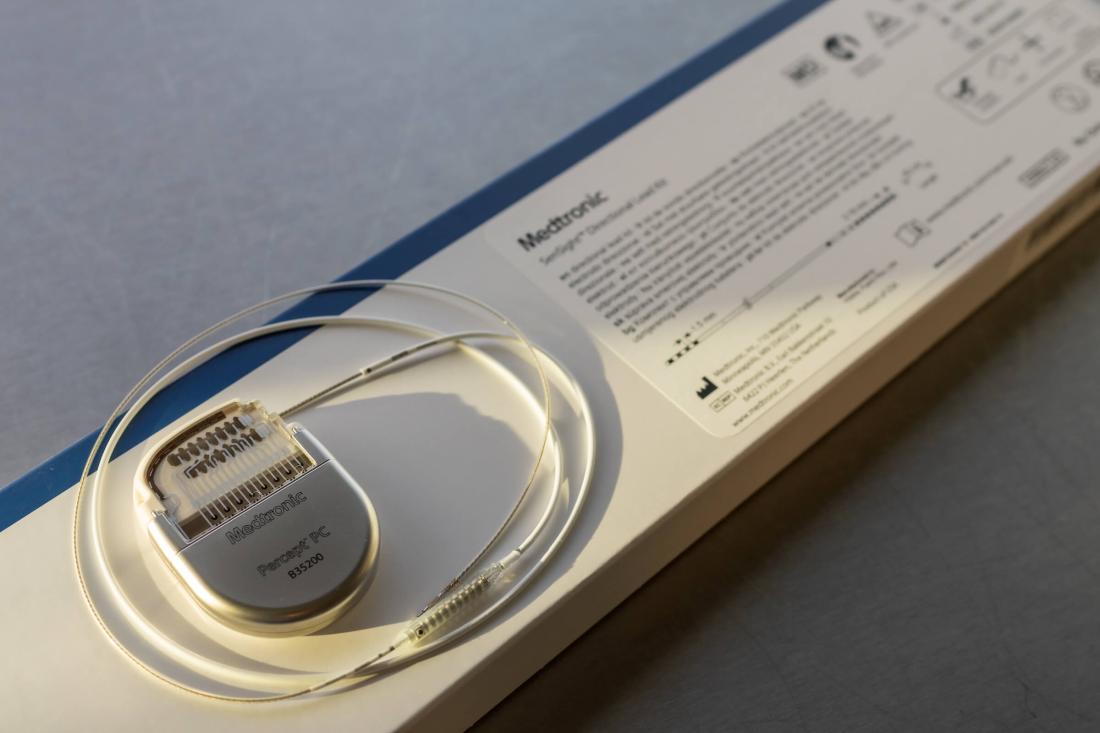UF Health first in U.S. to implant new, advanced deep brain stimulation system

A team of University of Florida Health neurosurgeons and neurologists recently became the first in the U.S. to implant a newly FDA-approved, technologically advanced deep brain stimulation system designed to more precisely target motor symptoms of Parkinson’s disease and two other movement disorders.
The team performed the procedure to implant Medtronic’s SenSight™ Directional Lead System in early June, shortly after its approval by the U.S. Food and Drug Administration for use in treating symptoms of Parkinson’s disease, dystonia and essential tremor.
Deep brain stimulation, or DBS, is an established treatment used in some patients to alleviate symptoms such as tremor, slowness and abnormal muscle contractions. In appropriately selected patients with debilitating symptoms despite treatment with medications, the addition of DBS therapy can provide significant symptomatic relief.
The treatment involves surgery to implant thin electrical wires, known as “leads,” into carefully selected brain areas and then connect the wires to a programmable pacemaker-like generator implanted under the skin of the upper chest to deliver beneficial stimulation to malfunctioning brain circuitry.
The new SenSight™ system combines two recent advancements: sensing capability that allows physicians to monitor brain signals in real-time and optimize settings for stimulation based on that data, and a “directional lead” that enables steering of electrical current for more precise targeting of stimulation through the electrode.

“Directional leads are not new, but combining steering capability with next-generation brain sensing capability will enable us to learn more about the brain, optimize DBS therapy and tailor it specifically to the needs of each individual patient in a way that has not been possible before,” said Kelly Foote, M.D., a professor of neurosurgery in the UF College of Medicine’s Lillian S. Wells Department of Neurosurgery and the neurosurgeon who performed the first implant.
“Our research team is heavily invested in brain sensing technology,” said Foote, co-director of the Norman Fixel Institute for Neurological Diseases at UF Health. “We believe DBS systems capable of adjusting therapeutic stimulation in response to continuously recorded signals from the brain may result in better DBS outcomes with fewer adverse effects. Adding a directional lead to such a system will improve our ability to localize abnormal signals and enable us to steer current more effectively to areas in the brain where it is most beneficial.”
After undergoing DBS surgery, patients are typically seen in clinic monthly for a six-month optimization phase to adjust and fine-tune stimulation settings for the most benefit.
“Optimization is achieving the best control of symptoms with minimal to no side effects from the stimulation,” said Leonardo Almeida, M.D., an assistant professor in UF College of Medicine’s department of neurology. “We hope this new system will help us get there faster and find the settings that yield the best results.”